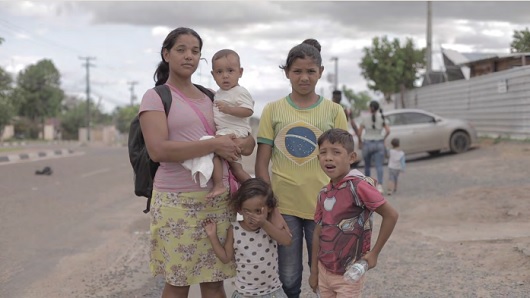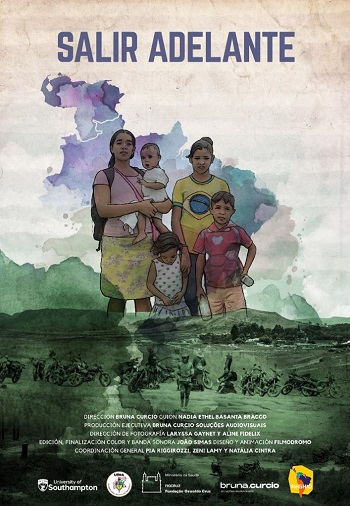Research analyzes sexual health of Venezuelan migrant women in Brazil
13/03/2023
Informe Ensp
The Venezuelan women and girls who migrated to Brazil make little use of contraceptive methods, have many children and came in search of health care services, a motivation to migrate second only to hunger. About 10% of them arrived in Brazil pregnant. The information is from an unprecedented survey by the National School of Public Health (ENSP/Fiocruz) and the Federal University of Maranhão (UFMA), coordinated by the University of Southampton, England. The study reveals the conditions of the migratory process and the impacts of forced migration on the sexual and reproductive health of women and adolescents. In total, 2,012 migrants aged 15 to 49 who arrived in Brazil between 2018 and 2021 were interviewed in Manaus (AM) and Boa Vista (RR). The interviewers were also Venezuelan.
Study reveals conditions of the migratory process and the impacts of forced migration on the sexual and reproductive health of women and adolescents (photo: 'Seguir Adelante')
The separation of mothers and children is one of the most worrying data related to the health of migrants. The study shows that around 25% of Venezuelan mothers left at least one child in their country of origin. In a self-assessment during the research, it was precisely they who reported the worst health status, as well as those who suffered some type of violence on the way to arrival in Brazil.
Among Venezuelan migrants, 40% have two or three children and 16% have four or more. Fertility rates are considered high, which is also harmful from a financial point of view, since, in addition to having to feed and care for many children, these women end up unable to work because they need to stay with them. Almost 80% of migrants live on less than the minimum wage. One of the recommendations made by the survey is the availability of kindergartens and schools for Venezuelan children and adolescents.
In this scenario, only 47% of Venezuelans in Brazil use some form of contraception, while among Brazilian women, the average is 80%. The percentage remained stable in relation to their behavior while they were still in Venezuela. The survey also shows that 63% of sexually active migrants have not used a male condom in the last 12 months, and 53% reported using some form of contraception, with injectable being the most recurrent method. “Access to contraceptive methods for Venezuelan women after arriving in Brazil was mainly through public health services, but many still buy them, despite their lack of resources. This means that, despite the offer, it is not easy for these women to find the methods that are offered for free. There is some barrier in accessing the methods and this needs to be solved”, analyzes the research coordinator at ENSP/Fiocruz, Maria do Carmo Leal.
The survey also showed that, at first, many women crossed the border to give birth in Brazil, using the SUS (the Brazilian public health system), and then returned to Venezuela. In a second wave, they came to have their children and remain in the country indefinitely. “Many were pregnant teenagers and arrived alone. In general, mothers migrate in search of education and health care for their children. When they leave children in Venezuela, their greatest desire is to send money for them to come. They do not break ties”, explains the coordinator of the part of the research carried out by UFMA, Zeni Carvalho Lamy.
Based on the women's reports, the period of border closure due to the COVID-19 pandemic was the most violent. Many Venezuelan women paid “trocheiros” to cross the forest and, on several occasions, these men exchanged the payment for sex or raped the women. “Stigma, discrimination, fear, trauma, as well as socioeconomic and linguistic inequalities affect access and behavior in seeking health care and protective services. Data and research that identify these barriers are needed to ensure better clinical practice and policy”, says project general coordinator Pia Riggirozzi, from the University of Southampton.
The same mistakes and improvements for Venezuelan and Brazilian women
In the second stage of the survey coordinated by ENSP/Fiocruz, the study did not identify discrimination in the health care provided to Venezuelan women, including prenatal care and childbirth. Interviews were conducted with 575 Brazilian and 315 Venezuelan women who gave birth to their children in a public maternity hospital in the North of Brazil in 2022. The objective was to find out and compare delivery care and obstetric characteristics, as well as clinical outcomes between Brazilian and Venezuelan postpartum women.
Both had the same access to prenatal care, reaching more than 95% of the interviewees. Foreigners started prenatal care later and had fewer consultations, since some arrived in Brazil already pregnant. According to Maria do Carmo Leal, the positives and negatives points of public health care have affected Brazilian women and migrants in a similar way. “The results are neither good for us nor for them: we have very low birth weight (average of 8%), a lot of prematurity (12%), severe maternal morbidity (10%). But, it is necessary to highlight the equity in the care of migrants within the SUS, reaffirming the inclusive character of the health system”, she says.
Documentary and photo book
 The study resulted in a book of photographs with images captured by Venezuelan migrant women, who had the opportunity to show their daily lives through their own points of view. In addition, the research also resulted in a movie. The documentary ‘Seguir Adelante’ is based on the stories of these Venezuelan migrant women and girls who fled the humanitarian crisis to rebuild their lives in Brazil.
The study resulted in a book of photographs with images captured by Venezuelan migrant women, who had the opportunity to show their daily lives through their own points of view. In addition, the research also resulted in a movie. The documentary ‘Seguir Adelante’ is based on the stories of these Venezuelan migrant women and girls who fled the humanitarian crisis to rebuild their lives in Brazil.
“Forced migration exacerbates all forms of gender injustice. For millions of Venezuelan women and girls who have fled hunger, health issues and violence, migrating to Brazil is a way to move forward in search of safety and well-being. But what happens when these women and girls arrive at a supposedly safe place?”, says the synopsis of the 26-minute documentary that is already pre-selected for film festivals.
The research from Fiocruz, UFMA and the University of Southampton is part of the project “Redressing Gendered Health Inequalities of Displaced Women and Girls” (ReGHID), funded by the Economic and Social Research Council (ESRC), from the United Kingdom. The research teams had the support of organizations and associations that help Venezuelan migrants, such as the Mexendo a Panela project, in Boa Vista, and Hermanitos, in Manaus.


